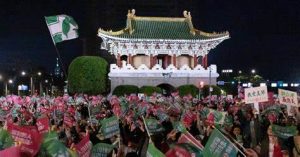Chinese President Xi Jinping is once again signaling China’s intention to reclaim Taiwan, adding a layer of complexity to the already tense US-China relations. Despite Xi’s determination, he avoids immediate military threats and refrains from setting a specific timetable for this ambition. As the West navigates this delicate situation, the challenge lies in persuading Xi that coercive actions towards Taiwan are not in the best interest of regional stability.

As Taiwan approaches its January 13 election, the majority of its population prefers diplomatic resolutions over military confrontation. Although Beijing has a significant arsenal pointed at Taiwan, and the US supplies arms to the island, there is a mutual dependence between the two sides. Taiwan benefits from Chinese markets, investments, and skilled labor, contributing significantly to its economic prosperity. Meanwhile, China has benefited from Taiwan’s technological expertise and investments, making the relationship symbiotic.
While US strategists have long considered the Taiwan Strait as a potential flashpoint, the economic interdependence between Taiwan and China suggests that military conflict would be counterproductive. Destroying the economic ties and technological collaboration built over decades would serve no strategic purpose.
Taiwanese political parties, despite their rhetoric, tend to favor the status quo, with varying degrees of leaning towards or away from China. Once in power, pragmatic considerations prevail, as both parties understand that the electorate prefers maintaining the existing state of affairs.
In Xi’s recent speech, the emphasis was on China being the senior partner, expressing a desire for peaceful reunification while cautioning about potential military consequences if Taiwan remains uncooperative. Resolving the dispute requires careful diplomacy.
Lyle Goldstein’s proposal in “Meeting China Halfway” suggests that the US should initiate military confidence-building measures without political preconditions. Reducing the planned redeployment of marines to Guam and encouraging China to relocate short-range missiles away from Taiwan could build goodwill and confidence.
Furthermore, institutionalizing a system allowing Taiwan to join international entities like the World Health Organization could be a positive step. The US, on its part, should halt the sale of new weapons systems, recognizing the symbolic but provocative nature of arms sales to an island off the coast of a rising nuclear power.
These actions, if taken, could pave the way for China to renounce the use of force, setting the stage for negotiations leading to a peace treaty. The goal would be to grant Taiwan full autonomy within a Greater China. However, any reunification must prioritize democratic principles and human rights, ensuring a more favorable outcome than what Hong Kong experienced.
Amidst the prevailing pessimism about Taiwan’s future, the key lies in proactive diplomatic measures. Regardless of the election outcome on January 13, Taiwan will continue to grapple with the challenge of balancing its relations with both the US and China.

